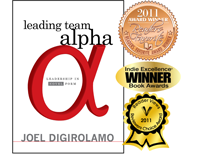A few weeks ago the 2012 Edelman Trust Barometer results were announced. It was a sad day for CEOs and government leaders. Trust that business, government, and NGOs (non-government organizations) will “do what is right” all declined. The credibility of CEOs took a hit, moving from 50% in 2011 to 38% in 2012. Government officials or regulators also declined in credibility from 43% to 29%.
As you well know, trust is a big deal. Leaders frequently bemoan to me the lack of trust from their subordinates. I’ve had the conversation enough times that it has caused me ponder the notion of a “trust intelligence.” We’ve got emotional intelligence, why not trust intelligence? It flows both ways, as well. Subordinates may not trust their superiors and superiors may not trust their subordinates.
Trust is a significant factor in team performance and contains many facets. Let’s look at a list of the elements a leader needs in order to earn trust:
- Social interaction, approachable
- Enthusiastic
- Takes initiative
- Resolves uncertainty as much as possible
- Consistent communication
- Responsive
- Calming
- Putting the team before self
- Fair
- Respectful
- Resolves conflict
- Honest
- Respects confidences
- Inclusive
- Focuses the effort
- Develops procedures when necessary
With this many facets it is clear that an individual would have difficulty learning to build trust by rote. I believe that the ability and desire to earn trust needs to come from an individual’s soul, from deep within, otherwise it is easily perceived as false and self-serving. Some leaders feel that they can demand or dictate trust. I wish it were so easy.
As you peruse through this list it may be helpful to list times when you have behaved in alignment with these elements and also which elements you might want to work on.
Concepts:
- Trust goes two ways—how much do you trust your team to get the job done and how much do they trust you to follow through on your commitments and remain authentic to them?
- A desire to build trust must come from authenticity rather as a means to achieve a performance goal.
Keywords: leadership, emotional intelligence, trust
References:
- Ansell, C., & Gash, A. (2008). Collaborative governance in theory and practice. Journal of public administration research and theory, 18(4), 543-571.
- Burke, C. S., Sims, D. E., Lazzara, E. H., & Salas, E. (2007). Trust in leadership: A multi-level review and integration. The Leadership Quarterly, 18(6), 606-632.
- Hempel, P. S., Zhang, Z. X., & Tjosvold, D. (2008). Conflict management between and within teams for trusting relationships and performance in China. Journal of Organizational Behavior. Retrieved from http://dx.doi.org/10.1002/job.540
- Jarvenpaa, S. L., & Leidner, D. E. (1998). Communication and Trust in Global Virtual Teams. Journal of Computer-Mediated Communication, 3(4). Retrieved from http://www.blackwell-synergy.com/doi/abs/10.1111/j.1083-6101.1998.tb00080.x
- Lee, P., Gillespie, N., Mann, L., & Wearing, A. (2010). Leadership and trust: Their effect on knowledge sharing and team performance. Management Learning, 41(4), 473-491.
- Likert, R. (1967). The human organization: Its management and value. New York: McGraw-Hill.
- Simpson, J. A. (2007). Psychological Foundations of Trust. Current Directions in Psychological Science, 16(5), 264-268.


